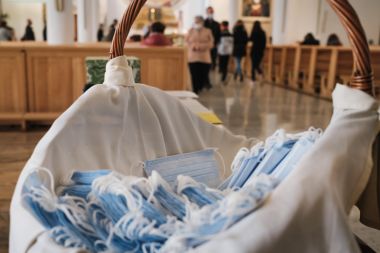Pity your pandemic-weary church minister? Not really

Are your church minister and other ministry leaders weary after two years of the pandemic? I should say so!
Concrete empirical research may be a little scant, but anecdotal evidence would suggest that they most likely are.
For one thing, I myself, as a rural pastor with three village churches, can testify to the fact that I – and others – are feeling undoubtedly frayed after the past 24 or so months.
And Andrew Roycroft, a Northern Irish pastor, has written in a thoughtful Twitter thread: "In 21 years-plus of pastoral ministry I have never spoken to so many weary colleagues. This isn't the normal tiredness arising from the rigours of ministry life, but is genuinely concerning spiritual fatigue."
He continues: "Covid-19 has presented a perpetual front line, and has demanded lots of snap decisions without the benefit of long term strategic planning. It is also a war of attrition, a long stand-off, a grinding battle against a continually morphing set of circumstances."
The whole thread is well worth reading.
It's a measure of what resonance that thread has found that it has been re-tweeted 83 times. And the responses indicated further anecdotal support for the assertion that pastors, elders, PCC members, bishops and so on are all pandemic-weary.
One person pointed to research on the "phases of collective trauma response" which has previously charted how congregations typically respond to a sudden shock (whatever that event might be). They suggested that currently we are in the "disillusionment phase" where clergy and others have to recognise that no amount of heroics can change or do much to mitigate the impact of what is happening. I could echo that, for sure.
Roycroft concludes by saying: "Some things are certain. Your pastor and elders are ordinary people. Many have broken hearts. Many are wrestling with personal and family issues of their own. They can feel helpless, commodified, and marginalised. They are breakable. They need prayer. They need you."
Again, I agree.
But - and it is a big 'but' - while all the above is undoubtedly true, and while all church members would be wise to be mindful of it, we (as church ministers) won't do ourselves any favours if we single ourselves out as a group needing special attention. And nor should we, really.
For the truth is that everyone is weary.
As Jill Richardson wrote in response to that Twitter thread: "The problem right now is that our congregants are also exhausted. Trying to share the load is a tough sell. We need to weather it together so we can do that on the other side."
We might think of staff in the National Health Service, for example. According to The Independent last week, "the Royal College of Nursing said nurses are 'already physically and emotionally exhausted' by the pandemic but staff shortages due to Covid-19 mean they are now wondering 'What is coming?'"
And education website edsurge.com reported a teacher saying: "I cannot recall a time in my career when I felt this much fatigue ... I feel like I have been teaching like my life depends on it for the last two years."
And it's not even just particular groups – be those of clergy, medics or teachers – but everyone, of course. A recent report in the Irish Times into the pandemic reported: "Half of those surveyed drank more, smoked more, gained weight or reported mental health problems."
Weariness and its concomitant knock-on effects is widespread, without doubt.
So what might we take away from all this? Should we just throw our hands up in despair? By no means! For our Christian faith provides the answer we need – in rediscovering rest.
A Franciscan brother writing in mid-2021 on the website of St Paul's Cathedral has some wise words: "In a world which has become addicted to accumulating, communicating and getting somewhere – insanely trying to fit more and more into often-over-full lives – the most significant thing we can do on a regular and substantial basis is simply to stop, take stock, remember, reflect, and to give thanks for the grace that has sustained us in these times."
And he then points us to the Sabbath, saying: "It has no useful or productive purpose [for us] except to be present – to each other, to the world around us and to the gracious Source and Giver of life... As Christians we believe that this abundance finds its fullest expression in Jesus Christ. He is himself our Sabbath."
So let's, perhaps, seek to rediscover and prioritise Sabbath rest, whatever form we understand that precisely to take. It is part of the rescue remedy for periods such as this that God himself has graciously given us. And who would want to say no to that?
David Baker is Contributing Editor to Christian Today and Senior Editor of Evangelicals Now www.e-n.org.uk in print and online. He writes here in a purely personal capacity.











